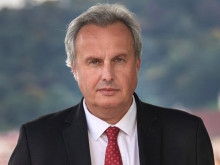Information literacy is essential in the fight against hybrid threats
The topic of hybrid threats and related information literacy has received a lot of attention recently. In hybrid warfare, non-military means are now as important as military ones. In order to be able to counter various psychological operations, propaganda or disinformation as effectively as possible, it is necessary to have a certain information literacy. In this context, we asked Colonel Otakar Foltýn, an expert on hybrid conflicts, government coordinator of strategic communication, and former chief of the Military Police, for an interview.

Is there any way to define exactly what information literacy is?
Information literacy is considerably more than the layman idea of understanding a message. It is the ability to understand to recognize what information is needed, when it is needed, and where i can find it. It then includes the ability to evaluate it correctly, use it and, where appropriate, pass it on, i.e. to teach myself and others. The goal is to make good decisions. The ethical dimension is therefore also important, that is, as with other human activities, not to act in contradiction or even against basic values and moral rules.
Which branch of government do you think should have information literacy in its portfolio of activities (Ministry of the Interior, Ministry of Education, etc.) and how can we ensure that all social and age groups are best reached?
In the long term, of course the Ministry of Education, but of course it is within the core values about strategic communication of all relevant government institutions. It may sound like a cliché, but this really needs to be coordinated thoughtfully across the whole range of government and non-government institutions. The Finnish example shows that it can be done.Understandably, both education and communication must accept the realities of the 21st century information environment and, above all, the fact that across age and interest groups you have to communicate with each target group in their language and style.
How do you think we can most effectively ensure that people learn to verify and evaluate information?
As in Finland, as already mentioned. First of all, we need to explain that there is such a huge amount of information that it is impossible to verify each one by common sense. You cannot really understand nuclear fusion, epilepsy treatment, or genetics without education and experience. So you have to learn to trust the institutions that have expertise in it. In general, then, you have to look at the world through the lens of core values such as freedom, justice, dignity and compassion. If information conflicts with these, it certainly cannot be accepted without verification. It seems simple, but it is actually very difficult to learn because it is also about value attitudes.
How do social networks, where everyone can disseminate their opinion quite massively, affect overall information literacy?
Quite fundamentally and usually negatively.The goal of social networks is, of course, as with any business project, profit.
That's perfectly fine, it's just that they generate it from targeting advertising. They are doing it more individually than ever before. The longer they keep you in front of the screen, the more they make. So they need your interest, and the easiest way to generate that is to use anger, disgust, hatred and fear. It doesn't work perfectly, of course the "scratching puppies" work too, but negative emotions are disproportionately more effective. When you combine that with prolonged screen retention, when you validate the consumer's opinion and add a clever app like liking, trouble is afoot. Because likes and similar interactions trigger the production of your own biochemicals like dopamine, making social networks "like addicts". This is an ingenious business model with incredibly large negative externalities in the form of radicalising society as a whole.
People today receive a huge amount of often contradictory information on certain topics. Isn't the evaluation of this information at the same extreme as when there is little information (such as in countries with totalitarian regimes) and in both cases it is so difficult to evaluate the message effectively because of these extremes?
Of course, it is usable by authoritarian regimes to project influence and divide our societies in very sophisticated ways. Moreover, it is very cheap compared to conventional military technology.
Critical thinking is essential for proper evaluation of information. In your opinion, is it also appropriate to use the "devil's advocate" mindset, or to take into account the advocacy of real or perceived bad actions?
Doubt and questioning are perfectly normal and desirable not only in science but also in judging one's own actions. Even the ability to doubt oneself is typical of people with superior intellect. However, discussing the acceptability of torture, pedophilia, or stealing is socially unacceptable for good reasons. The fundamental values on which our country is based also cannot tolerate relativization. Whether it is a good idea to become a dictatorship, or whether judging someone on the basis of race is the right approach is simply not up for debate.
In the mass media (television, radio), which still have a significant media presence and a great deal of trust from a part of the population, so-called experts and specialists on various topics (e.g. military and security issues) have recently appeared due to the great demand for certain information. However, their competence to comment on these topics is often questionable; moreover, these 'experts' continuously influence public opinion with their opinions, and people often adopt the opinion without further verification. To what extent do you see this as a threat in terms of relevant information for the population of the Czech Republic?
This is part of the question of how to build information literacy. Part of it is, among other things, the ability to evaluate the source of information and the ability of the media or interpreter to convey it rationally and objectively. This is, of course, countered by human laziness but also by the normal way the brain works when processing information, for example, the preference for processing and therefore accepting shocking or intimidating information. This is logical from an evolutionary point of view, but sometimes counterproductive in terms of functioning in modern society. The vast majority of evolution has been spent by modern man in an environment where it was necessary to address fear first, because otherwise it would be eaten away. But in modern society, that same function is used by populists who are happy to scare the electorate with the most meaningless information, just so they can sell them a solution that doesn't matter if it works. And all this with the support of social networking algorithms, which use anger, disgust and fear as the most reliable way of attracting attention and therefore targeting advertising.
Is it possible to distinguish targeted misinformation from a mistake arising from ignorance or simply a different perspective?
The fundamental difference between misinformation and disinformation is the intent to harm or influence entire segments of the population for illegitimate or illegal purposes. Disinformation is a lie whose author knows he is lying and intends to lie to do harm. Thus, if I claim that things are not black and white, that is fine in, for example, quantum physics or the issue of your relationship with your girlfriend. It's certainly not okay if Russian propaganda tries to tell you that nothing is true. Then you do not trust not only science, but also the institutions of your own state or the fundamental values on which it is based. And such people are unlikely to defend their state against an aggressor, especially if it's just a hybrid action without tanks.
In your opinion, is fact-checking an appropriate and realistic way to moderate the public debate in the current generally accelerated times, when, moreover, the public space is literally oversaturated with information?
It is a perfectly legitimate and common part of communication, but it is almost ineffective in the social media environment. It is pouring water out of the boat with a cup instead of plugging the crack in the hull. The media space is so saturated with information that it is quite impossible to refute all the lies. The solution is to teach the population how to know and what to believe - that is, to seek out objective sources of information, which ideally include state institutions and the public media. Finland has succeeded perfectly in this, but it did not carry with it the Czech legacy of distrust of its own state and institutions in general. It is all the more important that citizens know what to trust and why. If they trust objective sources, there is no need to refute lies that citizens do not care about.

Is there a lack of programmes in the current media space that use fact-checking?
It's not the shows themselves that are missing. For example, Nova Television's extremely successful Cyber Taboo, which provided a virtual public service in this regard. The programme itself briefly and succinctly explains, among other things, the functions of the modern information environment.
Is it possible to combat disinformation effectively at present on the basis of our legal system?
Of course. The legally complicated "blocking" of websites is a necessary tool in crisis situations, but otherwise an information-literate society and authentic, truthful, engaging and strong strategic state communication are far more important.
For example, if someone publicly declares Ukraine to be a fascist/Nazi state, is that legally actionable?
Depending on the intensity of the claim. The mere fact that someone parrots "Russian propaganda" is a matter of hostility towards the state system of the Czech Republic, or low intellect and the aforementioned information illiteracy. But stupidity is not legally punishable. Above all, however, it must be acknowledged that at a moment when, thanks to social networks and the Internet in general, verbal sewage that in the last century remained somewhere between a cheerleader and a dung beetle has spilled into the public space, criminal repression designed for a relatively small number of offences committed, as a rule, in the physical world, cannot work to punish even the most radical part of the thousands of verbal attacks that are increasing by the minute. It is true that the deterrent function of criminal sanction would begin to work with the right media coverage, but it will still be (for procedural reasons) with too much delay from the time of commission. The right approach, therefore, is an educated, confident and positive values-defending society that trusts its state. And this is precisely why Russian propaganda attacks intra-societal trust.

Disinformation is now a regular way of waging hybrid warfare, but it cannot be countered with military force. So how to proceed effectively?
The tool has always been disinformation, but in the modern information environment it is simply a more effective tool than ever before. Humans have always tried to use bodies of water for warfare, but until the invention of technologies to build large ships and naval guns, water was a secondary theater of war. The same is true of the information environment. Powerful computers, big data, and social networks have made cyberspace an extremely relevant theatre of war. Even there, the nature of war remains unchanged, and similar imperatives apply, such as maintaining the initiative in the first place. And this is where, among other things, we are failing by the absence of strategic communication.
Why do you think lies spread in the media space about 10 times faster than the truth?
As I said above, lies are subject to artificially induced anger and fear, which are reliable ways of generating and maintaining attention. Thus, in the interest of keeping ad consumers glued to the screen, social media algorithms are more likely to promote the very narratives with negative sentiment that simply work better. This is not because they want to disrupt society, but because it is economically beneficial to their business. However, the negative externality of their business is precisely the radicalisation that in the long run deteriorates the quality of the functioning of the state and therefore the wealth of society. But the internet giants are clearly not thinking that far ahead.





















